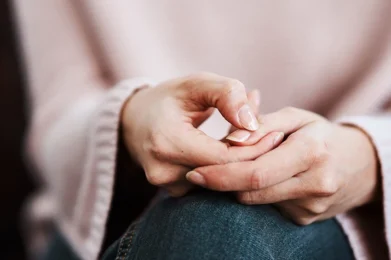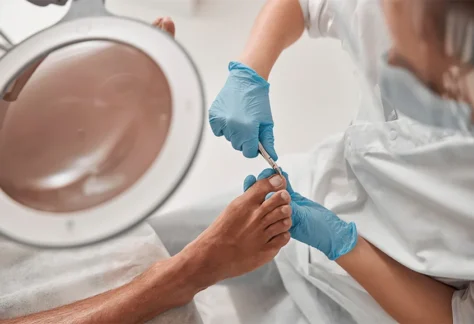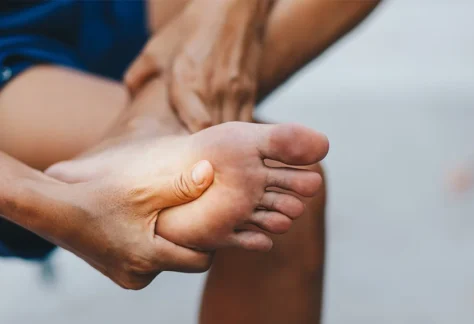In This Article:
- Opioids block pain signals and release large amounts of dopamine throughout the body. Opioid addiction occurs when someone becomes dependent on the pleasurable feelings created by opioid use. Addiction can happen in as little as five days.
- Signs of addiction include continued use, scars, repeated infections in the arm and legs from injections, withdrawal symptoms, drowsiness and isolation.
- Buprenorphine, methadone and naltrexone can be used to treat opioid addiction
Opioid addiction can lead to serious health problems — but how addictive are opioids?
Opioid addiction is a chronic disease that can lead to major health problems. But what exactly are opioid painkillers? And how addictive are opioids? Learn how opioids work to help you identify the signs of opioid addiction and when to seek help.
How do opioids work?
Opioids work by blocking pain signals sent from the brain to the body and releasing large amounts of dopamine throughout a person’s system. Opioid use disorder, or opioid addiction, occurs when someone’s body and brain become dependent on the pleasurable feelings created by opioid use.
A person’s limbic reward system is then rewired to adjust to the “new normal” as a result of continued opioid use. This disorder is classified as a chronic brain disease due to the chemical changes that take place within a person’s neurotransmitters. Opioid use changes the way a person thinks and feels, causing them to engage in risky behavior and appear at odds with their best interests.
Opioid addiction is what most commonly leads to overdose. In Maricopa County, for example, 92% of opioid overdoses in 2019 were deemed accidental. 91% of overdose deaths in that year also involved more than one drug. Since the disease itself increases your likelihood of engaging in risky behavior, many people struggling with opioid use disorder often consume other substances like alcohol, sleep medications, or methamphetamine.
How addictive are opioids?
While it’s difficult to know how addictive opioids are, dependence can often happen in as little as five days. One review of 38 opioid-related studies found that prescribed opioid misuse averaged between 21% and 29%, and addiction averaged between 8% and 12% of patients.
These numbers, however, can be misleading. Many patients take opioid medications for weeks (or longer) without becoming addicted. The likelihood of addiction often depends on many factors, including family history, socioeconomic status, mental health, situational circumstances and more. If your doctor feels opioids are necessary to treat your condition, they will help you set proper expectations and timelines to monitor the safest course of therapy that prevents any dependence of opioids.
Signs of opioid addiction
A friend or loved one struggling with opioid use disorder may not immediately display symptoms. However, over time, there may be several signs that they could need help. These include:
Continuing to use opioids despite losing control in their lives (e.g., losing a job, difficult relationships, legal troubles and poor health maintenance).
- Scars and repeated infections in the arm and legs from injections.
- Repeated cycles of withdrawal evidenced by cyclical nausea, sweating, fever and abdominal pain.
- Drowsiness and changes in sleep habits.
- Isolation from family and friends.
If you are worried about a friend, family member or coworker struggling with opioid use disorder, don’t be afraid to reach out. Sometimes the best place to start is with a conversation.
Opioid treatment
Substance use disorders, such as opioid addiction, can be best treated in either an outpatient therapy or inpatient program. One treatment method that shows effective results is MAT, or Medication-Assisted Treatment. This method uses medications, along with counseling and behavioral therapies, to help patients recover from opioid use. Several evidence-based MAT options include:
- Buprenorphine: Typically combined with Naloxone and sold under the brand name Suboxone, this medication suppresses and reduces cravings for opioids.
- Methadone: Reduces opioid cravings and withdrawal and blunts or blocks the effects of opioids.
- Naltrexone: Bocks the euphoric and sedative effects of opioids and prevents feelings of euphoria.
If you or a loved one are struggling with opioid addiction, Valleywise Health has the resources, services and caring staff members to provide personalized and dedicated care to support your recovery and assist you in improving your whole health.
Do you have questions about how addictive opioids are? Find a nearby Valleywise Community Health Center or call 1 (833) VLLYWSE to schedule an appointment to learn more.
Sources:
- https://www.hhs.gov/opioids/treatment/index.html
- https://www.samhsa.gov/medication-assisted-treatment/medications-counseling-related-conditions
- https://www.npr.org/sections/coronavirus-live-updates/2020/10/14/923721544/sharp-rise-in-drug-overdose-deaths-seen-during-1st-few-months-of-pandemic
- https://www.drugabuse.gov/publications/effective-treatments-opioid-addiction
- https://www.maricopa.gov/5079/Overdose-Deaths#:~:text=Total%20drug%20overdose%20deaths%20in,opioids%2C%20methamphetamines%2C%20or%20alcohol.







